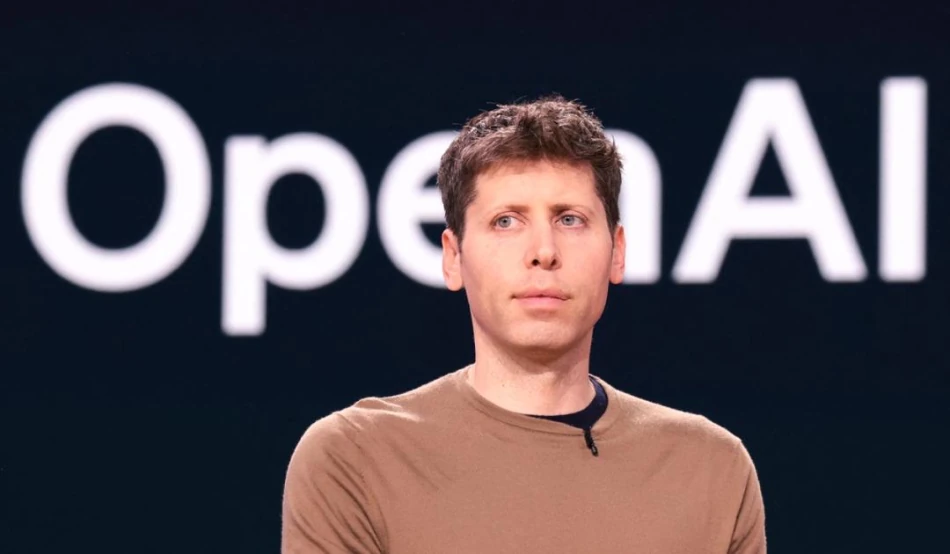
Sam Altman Unveils Visionary AI Innovations at GITEX: Shaping the Future of Artificial Intelligence
Dubai's GITEX Global 2025 is bringing together the world's top AI leaders to map out the next phase of national AI transformation. The 45th edition runs October 13-17 at Dubai World Trade Centre, marking a shift from fragmented AI adoption to comprehensive national strategies that integrate computing power, data governance, and institutional readiness.
OpenAI's Altman Makes His GITEX Debut
Sam Altman, CEO of OpenAI, will appear at GITEX for the first time alongside G42 Group CEO Peng Xiao. Their virtual discussion, "From Early Adoption to AI-Native Societies: Envisioning the New Age of Intelligence," focuses on moving beyond experimentation to full AI integration.
The conversation will explore how nations can build truly "AI-native" societies. This matters because we're seeing countries compete not just on AI tools, but on creating entire ecosystems where AI becomes fundamental to how societies operate.
The $5 Billion UAE-US AI Project Takes Center Stage
Executives from Core42 and the UAE-US Business Council will spotlight their 5-gigawatt UAE-US AI complex - the largest AI infrastructure outside the United States. The project represents how countries are building massive computing foundations to compete globally.
Leaders from G42, OpenAI, Microsoft, Cisco, Oracle, Khazna Data Center, and Cerebras will discuss smart infrastructure and the future global intelligence network. These aren't just tech presentations - they're blueprints for national competitiveness.
Real-World Applications Beyond the Hype
Abu Dhabi's government services platform "Tamm" will showcase practical AI implementation alongside Presight, Core42, OpenAI, Inception, AIQ, and Mohamed bin Zayed University of Artificial Intelligence. This session matters because it shows how governments actually deploy AI at scale, not just talk about it.
The conference brings together ministers, policymakers, CEOs, founders, and investors from over 180 countries. They'll tackle geopolitics, AI sovereignty, quantum computing prospects, cross-sector applications, investment priorities, and cybersecurity resilience.
The Numbers That Matter
GITEX features over 6,800 tech companies, 2,000 startups, more than 40 unicorn companies, and 1,200 investors managing assets exceeding $1.1 trillion. These figures translate to real influence on future strategies, business transformations, alliances, and economic forces reshaping global technology.
UBS Investment Bank estimates AI project funding will reach $375 billion in 2025. This raises critical questions about the geopolitical influence of these investments.
High-Level Government Perspectives
Ekaterina Zaharieva, EU Commissioner for Startups, Research and Innovation, will discuss Europe's push to convert its deep-tech advantages into strategic economic power. UAE Minister of Economy and Tourism Abdullah bin Touq Al Marri will address how countries must reset economic strategies for the AI transformation.
UAE Minister of State for AI and Digital Economy Omar Sultan Al Olama joins Canada's Minister of AI and Digital Innovation Ivan Solomon - Canada's first AI minister - for "The Super Intelligence Cycle." They'll explore how countries use AI to build resilience against economic volatility and establish digital leadership.
Where the Money Flows
Victor Gao, President of the China Energy Security Institute, meets Dr. Jörg Goschin, CEO of KfW Capital, Europe's largest state-backed venture capital fund worth €2.5 billion. Their discussion will examine how capital becomes a tool of technological and strategic power.
Naema Al Falasi, First Vice President of AI Strategy and Transformation at Mubadala - Abu Dhabi's sovereign fund managing over $302 billion - will share insights on integrating AI and machine learning into vital sectors to boost national competitiveness.
Corporate Blueprints and Chip Strategies
McKinsey reports that 92% of companies will accelerate AI investments in 2025, increasing pressure to generate tangible business value. Peter Koerte, CTO and Chief Strategy Officer at Siemens, will show how to turn industrial AI complexities into real competitive advantages.
Zulfi Alam, Microsoft's Vice President of Quantum Affairs, will address human capital, explaining how academia, government, and corporations must collaborate to build quantum-ready workforces.
Qualcomm's Wassim Chourbaji will represent chip manufacturers, offering new insights on achieving economic prosperity by aligning semiconductor and AI strategies. IBM's Ana Paula Assis will reveal multi-dimensional perspectives on business and governance futures as AI meets quantum computing, while IBM expands AI and quantum infrastructure across 100+ countries.
Founder Perspectives on the AI Economy
Andrew Feldman, CEO of Cerebras, will share the success strategy that took his company from startup to public listing. Greg Jackson, CEO of Octopus Energy - a $10 billion AI unicorn - will tackle the energy-AI paradox, questioning whether current infrastructure development can continue at present rates.
Ramin Hasani, CEO of Liquid AI, will unveil liquid neural networks - a scientific breakthrough inspired by microscopic worm brains that promises more adaptive and efficient AI systems.
Cybersecurity in the AI Age
The World Economic Forum's 2025 Global Cybersecurity Trends report reveals hackers increasingly use generative AI for advanced phishing attacks and malicious code development. Weekly attacks have risen 58% over the past two years.
Dr. Mohamed Al Kuwaiti, UAE Government Cybersecurity Chief, will showcase AI's role in protecting public service infrastructure and the nation's strategy to secure a $500 billion digital economy with 99% connectivity rates.
These discussions highlight key industry themes: speed versus sustainability, expansion versus flexibility, and established models versus emerging concepts. The stakes are significant as nations compete to become true AI powers rather than just AI adopters.
Most Viewed News

 Omar Rahman
Omar Rahman






